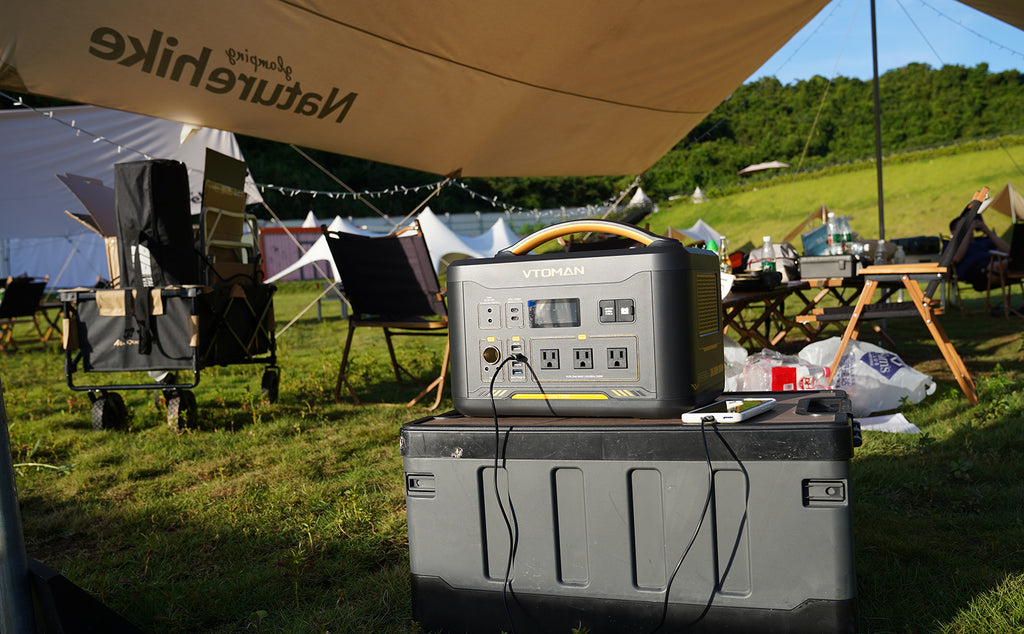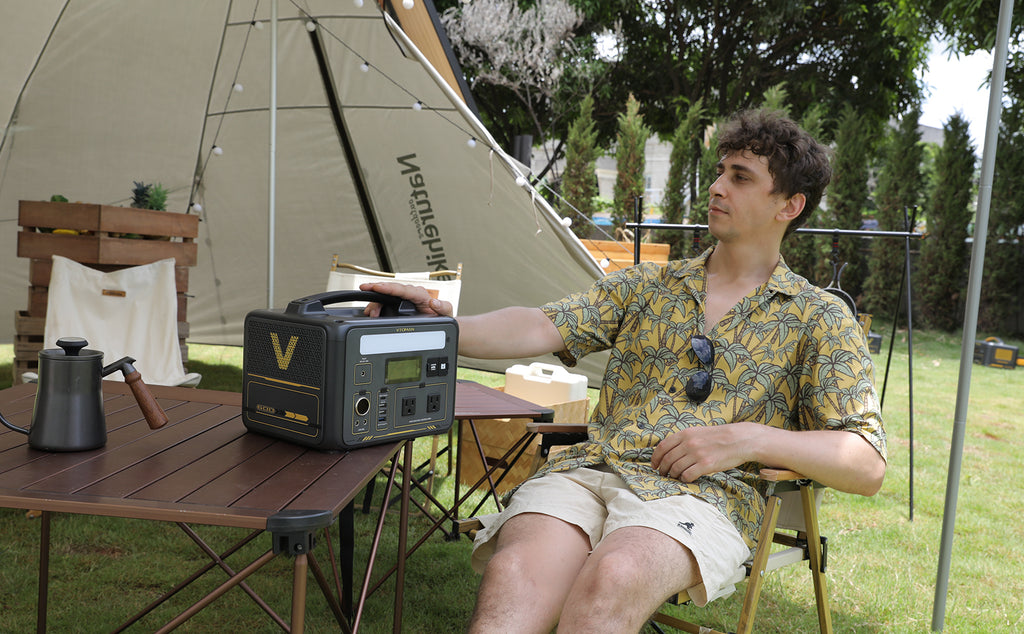"They light up your night but might just kill the vibe. Go Sooooooolar!"
IN the great outdoors, the whisper of wind through trees and the murmur of a distant creek are sounds many campers seek. Yet, the modern camper often faces a dilemma: How can we power essential gadgets and medical devices while preserving the natural quietude of the wild? This question brings us to the heart of a growing debate: Are generators worth it for camping?
Pros of Using Generators for Camping
- Emergency Backup and Medical Needs: The indispensable role of a generator is most apparent for those dependent on medical devices like CPAP machines. In remote campsites, where electrical power is a distant dream, a generator transitions from a mere convenience to an essential lifeline, ensuring these campers can enjoy the great outdoors without compromising their health.
- Multifunctionality: Beyond emergency needs, the utility of generators unfolds across a spectrum of camping comforts. They power campsite lights, keep communication devices charged, and even run small refrigerators. This versatility not only enhances camping comfort but also makes the wilderness more accessible to families with young children and those seeking a semi-rugged experience, bridging the gap between traditional camping and the comforts of home.
- Flexibility and Portability: The modern portable generator has come a long way, boasting compact designs and enhanced portability. Whether you're parked close to your vehicle in a well-equipped campsite or venturing into off-grid territories, these generators adjust to varied environments effortlessly, providing power wherever your adventure takes you without the logistical nightmares of yesteryears.
- Emergency Backup Power: The unpredictability of nature - from sudden storms to unforeseen technical glitches - can turn an idyllic retreat into a survival scenario. In such moments, the generator proves its worth, offering a reliable power source to recharge batteries, call for help, or navigate safely back to civilization, thereby transforming potential crises into manageable inconveniences.

Cons of Using Generators for Camping
- Noise Pollution: The once tranquil atmosphere of a campsite can be quickly compromised by the intrusive hum of a generator. This noise not only breaks the calm of the individual relying on the generator but also encroaches upon the peace of fellow campers. Such disruption challenges the very essence of seeking solace in nature, turning a serene escape into a source of tension.
- Environmental Impact: The operation of generators, dependent on the combustion of fossil fuels, results in the emission of carbon dioxide along with a suite of other pollutants. This environmental cost stands in stark opposition to the conservation ethos that drives many to the wilderness. Campers who prioritize minimizing their ecological footprint find this aspect particularly troubling, as it contradicts the principles of sustainability and the Leave No Trace philosophy.
- Inconvenience of Use: Beyond their environmental and auditory impacts, traditional generators introduce a practical burden. The need to transport fuel, coupled with the demands of regular maintenance and compliance with campsite-specific regulations, layers additional complexity onto the camping experience. For those drawn to the simplicity and spontaneity of camping, these logistical hurdles can diminish the allure of an outdoor adventure, transforming a getaway into a logistical challenge.
Why You Should Choose Solar Generators for Camping
If you go solar for camping generators, you'll have:
- Silence: Unlike traditional gas generators, solar generators operate without noise, preserving the natural soundtrack of your camping environment. The rustle of leaves, the distant call of wildlife, or the soothing sound of a nearby stream remain undisturbed, enhancing your immersive experience in the great outdoors.
- Eco-Friendliness: By opting for solar generators, you're selecting a power source that has a minimal environmental impact. Solar power is clean, renewable, and does not contribute to air pollution. This choice reflects a commitment to reducing your carbon footprint and supporting the health of our planet.
- Reliability: Modern solar generators are equipped with advanced battery technology that ensures power is available when you need it, even during overcast conditions. This reliability means you can enjoy the conveniences of modern life, such as lighting, charging devices, and powering small appliances, without the worry of running out of power.
- Convenience: Solar generators are designed for ease of use. With portable models available, they are easy to transport and set up, making them a practical addition to any camping trip. Plus, without the need for fuel, you eliminate the hassle and expense of gas, as well as the worry about transporting and storing it safely.
- Sustainability: When you choose solar, you're investing in a power source that aligns with sustainable camping practices. Solar power doesn't deplete finite resources or harm ecosystems, making it an ideal choice for those who wish to camp responsibly and leave a minimal impact on the environment.

What We Want to Say
We have constantly heard from camping lovers who often highlight a shared desire for quieter, less intrusive ways to enjoy our stays in nature. The hum of a gas generator, while convenient for some, often disrupts the peace that so many of us seek when we retreat into the great outdoors.
Here, we strongly hope that if using gas generators, you could adhere to a set of respectful practices when bringing generators into campgrounds:
- Adhere to designated quiet hours, typically from 10 PM to 6 AM, during which the use of generators is discouraged or prohibited.
- Operate your generator within designated generator zones when available, especially if usage is necessary outside of quiet hours.
- Keep a respectful distance between your generator and neighboring sites to prevent your power needs from disrupting others' tranquility.
Stepping into the future, we are enthusiastic proponents of solar generators, particularly the portable kind. These devices represent a leap forward in camping technology, offering a silent, eco-friendly alternative to traditional gas-powered units. Solar generators not only eliminate noise and air pollution but also align with the principles of Leave No Trace, allowing us to enjoy modern conveniences without compromising the integrity of our natural surroundings.
We believe that by embracing these guidelines and considering the switch to solar power, we can collectively enhance the camping experience for everyone involved. It's about finding a balance between enjoying the comforts of today's technology and preserving the serene beauty of nature for tomorrow's adventurers. Together, let's make every camping trip a harmonious blend of modern convenience and natural tranquility.
FAQs
- 1.What size solar generator is best suited for camping?
- The ideal size of a solar generator for camping depends on your power needs. For basic needs like charging phones and cameras and powering small lights, a generator with a capacity of around 150-250Wh should suffice. For more extensive needs, including running small appliances or powering equipment in an RV or camper, look for generators in the range of 500Wh to 1000Wh or higher. Assess your power consumption before deciding to ensure the generator meets your requirements.
- 2.Can a solar generator power my RV or camper?
- Yes, a solar generator can power your RV or camper, but the capacity needed depends on what you intend to run. For essential lighting, charging devices, and small appliances, a medium-sized generator (around 1000Wh to 2000Wh) might be adequate. For larger demands, including air conditioning or heating elements, you might need a more substantial system (2000Wh and above). It's crucial to calculate your power needs or consult with an expert when selecting a solar generator for your RV or camper.
- 3.Are solar generators better than RV generators?
- Not necessarily. Choose a solar generator if environmental sustainability and a quiet camping experience are your top priorities, especially suitable for lower power needs and when camping in areas with ample sunlight. However, for high power demands and guaranteed energy regardless of weather conditions, an RV in-built generator is the better choice, offering robust performance ideal for powering air conditioning, heating, and large appliances.
- 4.How do I calculate how much power I need for camping?
- To calculate your power needs, list all the devices you plan to use and their power consumption (usually in watts). Consider how many hours per day you'll use each device. Multiply the wattage by the hours of use to get watt-hours (Wh) per day for each device. Add these up to get a total Wh per day, which will help you determine the capacity of the solar generator you need.
- 5.Can I use a solar generator at night?
- Yes, solar generators store power in their built-in batteries, allowing you to use the stored energy at night or during cloudy days. The key is to ensure your generator has enough storage capacity to meet your night-time power needs. Planning your energy usage and having a clear understanding of your generator's storage capacity is essential for an uninterrupted power supply.
- 6.Can I use a generator during cloudy days?
- Yes, you can use a solar generator during cloudy days. Solar generators store energy in their built-in batteries, which can be used to power your devices even when direct sunlight isn't available. The efficiency of solar panels decreases in cloudy conditions, meaning they generate less power than on sunny days. However, if your generator's battery is adequately charged before the cloudy weather sets in, you'll have a reserve of power to draw from. It's always a good strategy to monitor your power usage and conserve energy when relying on solar power during less sunny periods to ensure you have enough power for your essential needs.
Read More
- Top 5 Reasons to Own a Portable Solar Generator for Homeowners – VTOMAN
- Portable Solar Generators for RVs: Everything You Need to Know – VTOMAN
- Portable Solar vs. Gas Generators: Your Ultimate Guide – VTOMAN
- Why is VTOMAN power station appropriate for RVs?
- Summer Adventure Guide: Key Essentials for Outdoor Fun & Safety – VTOMAN












